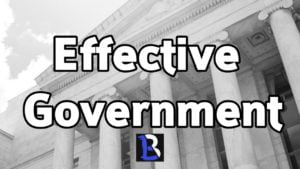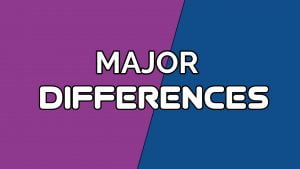Differences between government and state: The term “government” and “state” are often used interchangeably as they can mean the same thing, depending on the construction of the sentence and the meaning intended. They have two things in common; the involvement of people and politics.
A state can be referred to as the mother of the government, as it is the people constituting of the state that decide amongst themselves which government should be used in governing the affairs of the country and how the state should be governed.

Going further, it is important to note that a state is an entity in the international legal system. Government on the other hand, is an exclusive coercive organization created for the purposes of making and enforcing decisions to cater for the welfares of a state.
Also see: Differences between military rule and democracy
Meaning of a government
For the purpose of this article, government would be looked at from two perspectives; first as an institution, and as an art of governing.
Government As An Institution Of The State:
Government as an institution of the state is a machinery established by the state to organize, manage, and administer the day to day affairs of the state. It is a machinery set in place by the members of the state (that is the population of people living in the state who are called citizens), through which the will of the state is formulated, expressed and executed. Government as an institution of the state is very vital to the existence of a state. A state without a government is open to anarchy.
Government as an institution of the state has three organs/structures and the functions of each are stipulated in the constitution. They are:
a. The executive: this organ is charged with formulation and implementation of policies.
b. The legislative: the legislative has the duty of making laws on behalf of the state, and formulating policies.
c. The judiciary: The judiciary is charged with interpretation of the laws formulated by the legislative. It is otherwise known as the hope of the common man.
Also see: Differences between presidential and parliamentary system of government
Government As a Process Or Art of Governing
Government is a body vested with power of running the day to day affairs of the state. Hence, it is charged with maintaining peace and order, protecting the citizens fundamental human rights, ensuring that the provision of quality life for its citizens and formulating policies for the state and its citizens.

Functions of Government
The major functions of government are:
a. Making of laws to provide guidelines for its citizens.
b. Ensuring the maintenance of law and order.
c. Ensuring that the country has enough man power and equipment for defense.
d. Provision of social amenities for members of the public.
e. Protection of lives and property.
f. Creation of jobs and employment opportunities for its citizens.
g. Ensuring the administration of justice.
h. Formulation and implementation of state policies.
I. Promotion of economic activities.
RECOMMENDED: Differences between a deed and an agreement in law
Meaning of a State
A state is a politically organized group of people, inhabiting a defined territory, free from external control and possessing the ability to ensure obedience from its citizens.
Examples of states are Nigeria, Ghana, Canada, U.S.A, etc.

For a place or organization to qualify as a state, the following characteristics must be present and operating:
a. Permanence: A state is a permanent entity. Once created, it is everlasting. Unless of course, the population decides to invoke their right to self- determination and seek for a referendum, like Iraq did in 2011.
b. A defined territory: The geographical space consisting of where the population consisting of the state inhabits, should be well defined with boundaries clearly stated.
c. Government: This is a body created by the people and charged with formulating state policies, managing the affairs of the people and preserving the sovereignty of a state. Government is a very important element of a state and its absence invokes anarchy.
d. Sovereignty: Every state should have the power to make decisions without interference from external bodies.
e. Population: This is the number of people living in a particular area. A state should have a population, that is, people living in its geographical space.
f. Recognition: a state must be recognized as an independent entity home and abroad.
Must read: Differences between a Decree and an Edict
Differences Between Government and State

1. The state is a bigger umbrella of which government is an aspect of. The intention and will of the state is expressed through the government of the country. However, government acts as an agent of the state, by implementing laws, executing the laws and interpreting them. It is also charged with ensuring that the lives of the citizens are protected, and that the sovereignty of the state is not threatened.
2. The state is a natural institution, existent since time immemorial. However, Government is a man-made theory and there are conflicting theories as to how government came to be. Two major theories are the social contract theory and the history and tradition theory.
According to the social contract theory, there was anarchy and man behaved according to the way he deemed fit. This continued till a meeting was held, and the population decided to strip themselves and their freedom and vest it in the leviathan.
But the history and tradition theory holds different. According to this theory, government has always existed, as the first man made decisions for his family and gave the do’s and dont’s. Hence, man did not reach the state of anarchy as stated by the social contract theory.
Also read: How to become a successful lawyer: Top qualities of a good lawyer
3. State is an invisible, abstract concept. It is a name used to denote a community of persons living in a clearly defined territory, with a government and population. However, the government is visible, as they comprise of the people running the state with the approval of the people living in the state.
4. Citizenship of a state is often than not, as a result of birth. Hence, it is something the person has no control over, unless of course he/she denounces citizenship in place of another (this requires a very long process).
Government on the other hand can be chosen by the people. This includes choosing the mode of operation, the system of government and the structure put in place.
5. Government lacks permanence, as it changes from time to time. However, the state remains as it is, unmoved and unshaken. Except when the citizens decide to conduct a referendum and exercise their right to self- determination.
6. State has a definite form, that is, its features (definite territory, population, permanence, government), are constant.
Government on the other hand is of so many types, and structures depending on the choices of the people. A few are monarchy, oligarchy, democracy, autocracy etc.
Also see: How to write an affidavit perfectly
7. Lastly, one essential feature of a state is a well- defined territory. The state has a geographical expanse, and the boundary should be clearly defined. The difference however is that while the territory is a part of the state, the government is saddled with the responsibility of preserving, protecting and defending the territory from outsiders.
Meanwhile, before I conclude, I highly recommend that you watch the YouTube video below for more explanation of the meaning and differences between a state and a government.
In conclusion, government is a part of the larger entity, called the state. Whilst the state comprises of a number of people living and dwelling in a particular territory, government refers to the chosen few, elected and appointed by the people to rule over the others.

Edeh Samuel Chukwuemeka, ACMC, is a lawyer and a certified mediator/conciliator in Nigeria. He is also a developer with knowledge in various programming languages. Samuel is determined to leverage his skills in technology, SEO, and legal practice to revolutionize the legal profession worldwide by creating web and mobile applications that simplify legal research. Sam is also passionate about educating and providing valuable information to people.
Well articulated and simplified..God bless u